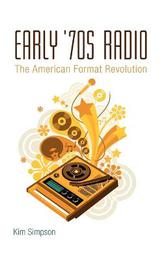
|
Early '70s Radio: The American Format Revolution
Hardback
Main Details
| Title |
Early '70s Radio: The American Format Revolution
|
| Authors and Contributors |
By (author) Kim Simpson
|
| Physical Properties |
|
| Category/Genre | Radio
Rock and Pop |
|---|
| ISBN/Barcode |
9781441157584
|
| Classifications | Dewey:791.443097309047 |
|---|
| Audience | | Postgraduate, Research & Scholarly | |
|---|
| Illustrations |
30
|
|
Publishing Details |
| Publisher |
Continuum Publishing Corporation
|
| Imprint |
Continuum Publishing Corporation
|
| Publication Date |
21 July 2011 |
| Publication Country |
United States
|
Description
Early '70s Radio focuses on the emergence of commercial music radio "formats," which refer to distinct musical genres aimed toward specific audiences. This formatting revolution took place in a period rife with heated politics, identity anxiety, large-scale disappointments and seemingly insoluble social problems. As industry professionals worked overtime to understand audiences and to generate formats, they also laid the groundwork for market segmentation. Audiences, meanwhile, approached these formats as safe havens wherein they could re-imagine and redefine key issues of identity. A fresh and accessible exercise in audience interpretation, Early '70s Radio is organized according to the era's five prominent formats and analyzes each of these in relation to their targeted demographics, including Top 40, "soft rock", album-oriented rock, soul and country. The book closes by making a case for the significance of early '70s formatting in light of commercial radio today.
Author Biography
Kim Simpson, PhD, is a writer, musician, and radio host living in Austin, Texas.
ReviewsKim Simpson does a superb job analyzing the manifold factors that contributed to the radio format revolution while advancing the reader's understanding of a transformative period in American culture. Ultimately, Simpson's astute assessment of radio's second heyday adds richly to the ever-growing canon of media studies. Early '70s Radio is must reading for anyone interested in the unique role specialized audio programming played in an era of historic social change. -- Michael C. Keith, Author of The Radio Station All of the men and women, though the latter were few in music radio for many years, took radio programming seriously not only as a career, but also with passion for its viability. This included the disc jockey, the program director, and the general manager as more and more of them graduated from programming into management. Thus, I'm pleased to read this wonderful, compelling book by Kim Simpson. He treats with respect what all of us in the 60s and 70s took seriously. It was our life! And he employs penetrating wisdom and astonishing perception to correlate music with the cultural mores of our times and depict what really was and why. Great book! --Claude Hall, B.J., M.Ed. Radio-TV Editor, Billboard, 1964-79, and Assistant Communications Professor, State University of New York at Brockport, 1983-89 Too often we separate the agendas contained in business plans from the decisions of daily life. Kim Simpson's Early '70s Radio reunites the items found on playlists with the passions and polemics that infused a complicated decade. His skilful scholarship and attention to detail clarify that what we listen to and how we lead our lives do not march to separate beats, for our actions and our aesthetic preferences bear subtle and significant harmonies. --David Sanjek, Professor of Music Director, Salford Music Research Centre University of Salford, U.K. Early '70s Radio is a fast-paced romp through the formatting revolution that changed the ways pop music continues to be sliced and diced. Surprises pop off every page. Examining everything from monster hits to obscure and often-hilarious novelty tunes, Kim Simpson shows how Top 40 splintered into middle of the road soft rock, album-oriented hard rock, crossover soul and disco, and country pop. Each format promised to serve up a distinct listening demographic to hungry advertisers. Yet Simpson uncovers fascinating commonalities across the dial-including the increasing desire of stations to attract women instead of men-that fundamentally changed the sound of pop music. And who knew there were so many songs featuring children in the era? If you ever wondered about the roots of the Miley Cyrus/Justin Beiber phenomenon or how Glee learned to appeal to parents and their kids at the same time, Early '70s Radio delivers. I'll never listen to "Yummy, Yummy, Yummy" or "Rubber Duckie" the same way again. -- Karl Hagstrom Miller, author of Segregating Sound: Inventing Folk and Pop Music in the Age of Jim Crow Music historians are only now discovering what most everybody in the 1970s already knew: commercial radio formats really really mattered. Looking at the five key strands (Top 40, MOR, rock, R&B, and country), Kim Simpson surveys a moment when identity politics and counterculture were becoming niche marketing and new kinds of mainstreams. You can't explain what happened to American popular music after the 1960s without understanding these processes, and Simpson provides an able, accessible guide through a daunting range of sounds and contexts. --Eric Weisbard, University of Alabama and editor, Listen Again: A Momentary History of Pop Music
|